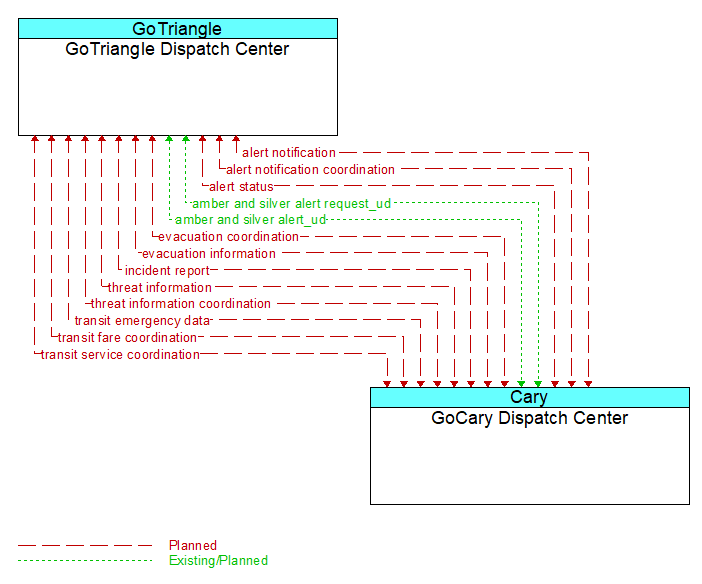Interface: GoTriangle Dispatch Center - GoCary Dispatch Center

Architecture Flow Definitions
alert notification (Planned) Applicable ITS Standards
Notification of a major emergency such as a natural or man–made disaster, civil emergency, or child abduction for distribution to the public. The flow identifies the alert originator, the nature of the emergency, the geographic area affected by the emergency, the effective time period, and information and instructions necessary for the public to respond to the alert. This flow may also identify specific information that should not be released to the public.
alert notification coordination (Planned) Applicable ITS Standards
Coordination of emergency alerts to be distributed to the public. This includes notification of a major emergency such as a natural or man–made disaster, civil emergency, or child abduction for distribution to the public and status of the public notification.
alert status (Planned) Applicable ITS Standards
Information indicating the current status of the emergency alert including identification of the traveler and driver information systems that are being used to provide the alert.
amber and silver alert request_ud (Existing/Planned)
A request for an amber alert. Includes information required for an amber alert, including the identity and description.
amber and silver alert_ud (Existing/Planned)
Amber alert information to be placed on dynamic message signs controlled by a traffic management element or on the emergency alert system (EAS).
evacuation coordination (Planned) Applicable ITS Standards
Coordination of information regarding a pending or in–process evacuation. Includes evacuation zones, evacuation times, evacuation routes, forecast network conditions, and reentry times.
evacuation information (Planned) Applicable ITS Standards
Evacuation instructions and information including evacuation zones, evacuation times, and reentry times.
incident report (Planned) Applicable ITS Standards
Report of an identified incident including incident location, type, severity and other information necessary to initiate an appropriate incident response.
threat information (Planned) Applicable ITS Standards
Threats regarding transportation infrastructure, facilities, or systems detected by a variety of methods (sensors, surveillance, threat analysis of advisories from outside agencies, etc.
threat information coordination (Planned) Applicable ITS Standards
Sensor, surveillance, and threat data including raw and processed data that is collected by sensor and surveillance equipment located in secure areas.
transit emergency data (Planned) Applicable ITS Standards
Initial notification of transit emergency at a transit stop or on transit vehicles and further coordination as additional details become available and the response is coordinated.
transit fare coordination (Planned) Applicable ITS Standards
Fare and pricing information shared between local/regional transit organizations.
transit service coordination (Planned) Applicable ITS Standards
Schedule coordination or AVL information shared between local/regional transit organizations. This includes coordination of connections between transit properties.